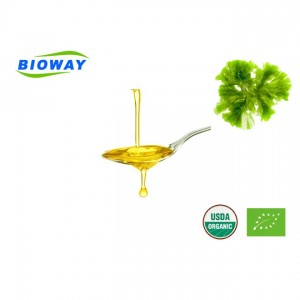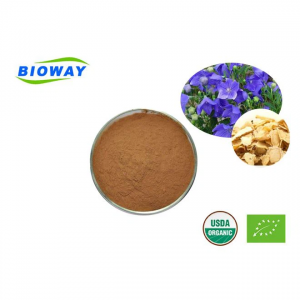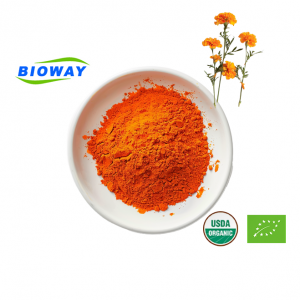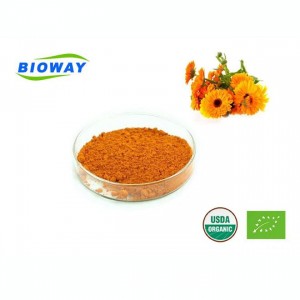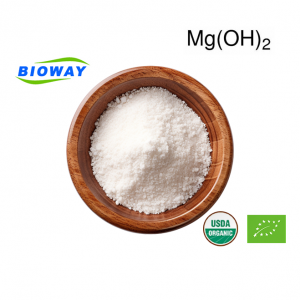Pure Sodium Ascorbate Powder
Pure Sodium Ascorbate Powder is a form of ascorbic acid, which is also known as vitamin C. It is a sodium salt of ascorbic acid. This compound is commonly used as a dietary supplement to provide the body with vitamin C. Sodium ascorbate is often used as an antioxidant to prevent or treat vitamin C deficiency. It is also frequently used in the food industry as a food additive, as it enhances the stability and shelf life of certain products.
| Product name | Sodium Ascorbate | ||
| Test item(s) | Limit | Test result(s) | |
| Appearance | White to yellowish crystalline solid | Complies | |
| Odor | Slightly salty and odorless | Complies | |
| Identification | Positive reaction | Complies | |
| Specific rotation | +103°~+108° | +105° | |
| Assay | ≥99.0% | 99.80% | |
| The residue | ≤.0.1 | 0.05 | |
| PH | 7.8~8.0 | 7.6 | |
| Loss on drying | ≤0.25% | 0.03% | |
| As, mg/kg | ≤3mg/kg | <3mg/kg | |
| Pb, mg/kg | ≤10mg/kg | <10mg/kg | |
| Heavy Metals | ≤20mg/kg | <20mg/kg | |
| Bacteria counts | ≤100cfu/g | Complies | |
| Mold & Yeast | ≤50cfu/g | Complies | |
| Staphylococcus aureus | Negative | Negative | |
| Escherichia coli | Negative | Negative | |
| Salmonella | Negative | Negative | |
| Conclusion | Complies with standards. | ||
High-quality: Our sodium ascorbate is sourced from reputable manufacturers, ensuring high quality and purity.
Antioxidant properties: Sodium ascorbate is a potent antioxidant that helps protect the body against oxidative stress and damage caused by free radicals.
Enhanced bioavailability: Our sodium ascorbate formulation has superior bioavailability, ensuring maximum absorption and effectiveness in the body.
Non-acidic: Unlike traditional ascorbic acid, sodium ascorbate is non-acidic, making it a more gentle option for individuals with sensitive stomachs or digestive issues.
pH balanced: Our sodium ascorbate is carefully formulated to maintain a proper pH balance, ensuring stability and effectiveness.
Versatile: Sodium ascorbate can be used in various applications, including food and beverage production, dietary supplements, and personal care products.
Shelf-stable: Our sodium ascorbate is packaged and preserved to maintain its potency and stability over time, providing a longer shelf life.
Affordable: We offer competitive pricing options for our sodium ascorbate products, making them accessible for individual consumers and businesses.
Regulatory compliance: Our sodium ascorbate meets all necessary regulatory standards and certifications, ensuring its safety and adherence to quality control measures.
Excellent customer support: Our dedicated team is available to provide assistance and answer any questions or concerns regarding our sodium ascorbate products.
Sodium ascorbate, a form of vitamin C, offers several health benefits:
Immune system support: Vitamin C is essential for a healthy immune system. Sodium ascorbate can help boost immune function, strengthen the body's defense against infections, and shorten the duration of colds and flu.
Antioxidant protection: As an antioxidant, sodium ascorbate helps neutralize harmful free radicals in the body that can damage cells and contribute to chronic diseases like heart disease, cancer, and neurodegenerative disorders.
Collagen production: Vitamin C is crucial for the production of collagen, a protein that plays a vital role in maintaining healthy skin, bones, joints, and blood vessels. Sodium ascorbate can support collagen synthesis and promote skin health, wound healing, and joint function.
Iron absorption: Sodium ascorbate enhances the absorption of non-heme iron (found in plant-based foods) in the gut. Consuming vitamin C-rich sodium ascorbate alongside iron-rich foods can improve iron uptake and prevent iron deficiency anemia.
Antistress effects: Vitamin C is known to support adrenal gland function and help the body cope with stress. Sodium ascorbate can assist in reducing stress levels, supporting cognitive function, and improving mood.
Cardiovascular health: Vitamin C may help lower blood pressure, improve blood vessel function, and reduce the risk of heart disease by preventing the oxidation of LDL cholesterol and reducing inflammation.
Eye health: As an antioxidant, sodium ascorbate can help protect the eyes from oxidative stress and damage caused by free radicals. Vitamin C intake has also been associated with a reduced risk of cataracts and age-related macular degeneration.
Allergy relief: Sodium ascorbate can support the reduction of histamine levels, providing relief from allergy symptoms like sneezing, itching, and congestion.
As with any supplement, it is important to consult with a healthcare professional before starting sodium ascorbate or any new dietary regimen to ensure it is safe and appropriate for your individual health needs.
Sodium ascorbate has a wide range of application fields. Some of the common application fields include:
Food and Beverage Industry: Sodium ascorbate is used as a food additive, mainly as an antioxidant and preservative. It helps prevent color and flavor deterioration, as well as inhibiting lipid oxidation in various food products like cured meats, canned foods, beverages, and bakery items.
Pharmaceutical Industry: Sodium ascorbate is utilized in the pharmaceutical industry as an active ingredient in various over-the-counter and prescription medications. It is commonly found in vitamin C supplements, immune system boosters, and dietary formulations.
Nutraceutical and Dietary Supplement Industry: Sodium ascorbate is utilized in the production of nutraceuticals and dietary supplements. It is used as a source of vitamin C, which plays a crucial role in supporting immune function and overall health.
Cosmetic and Personal Care Industry: Sodium ascorbate is incorporated into skincare and personal care products for its antioxidant properties. It helps reduce the signs of aging, such as fine lines and wrinkles, by protecting the skin from free radicals and promoting collagen synthesis.
Animal Feed Industry: Sodium ascorbate is added to animal feed formulations as a nutritional supplement for livestock and poultry. It helps improve their overall health, immunity, and growth rate.
Industrial Applications: Sodium ascorbate is used in some industrial processes, such as the production of photographic developers, dye intermediates, and textile chemicals.
It's important to note that the specific application and dosage of sodium ascorbate may vary depending on the industry and intended use. It is always recommended to consult industry-specific guidelines, regulations, and expert advice when incorporating sodium ascorbate into your products.
The production process of sodium ascorbate involves several steps. Here is an overview of the process:
Raw material selection: High-quality ascorbic acid is selected as the main raw material for sodium ascorbate production. Ascorbic acid can be derived from various sources, such as natural sources like citrus fruits or synthetically produced.
Dissolution: The ascorbic acid is dissolved in water to form a concentrated solution.
Neutralization: Sodium hydroxide (NaOH) is added to the ascorbic acid solution to neutralize the acidity and convert it into sodium ascorbate. The neutralization reaction produces water as a byproduct.
Filtration and purification: The sodium ascorbate solution is then passed through filtration systems to remove any impurities, solids, or unwanted particles.
Concentration: The filtered solution is then concentrated to achieve the desired sodium ascorbate concentration. This process can be done through evaporation or other concentration techniques.
Crystallization: The concentrated sodium ascorbate solution is cooled down, promoting the formation of sodium ascorbate crystals. The crystals are then separated from the mother liquor.
Drying: The sodium ascorbate crystals are dried to remove any residual moisture, and the final product is obtained.
Testing and quality control: The sodium ascorbate product is tested for quality, purity, and potency. Various tests, such as HPLC (High-Performance Liquid Chromatography), may be conducted to ensure the product meets the required specifications and standards.
Packaging: The sodium ascorbate is then packaged in suitable containers, such as pouches, bottles, or drums, to protect it from moisture, light, and other external factors that may degrade its quality.
Storage and distribution: The packaged sodium ascorbate is stored in suitable conditions to maintain its stability and potency. It is then distributed to wholesalers, manufacturers, or end consumers.
It's important to note that the specific production process may vary depending on the manufacturer or supplier. They might employ additional purification or processing steps to further enhance the quality and purity of the sodium ascorbate.
Storage: Keep in a cool, dry, and clean place, Protect from moisture and direct light.
Bulk Package: 25kg/drum.
Lead Time: 7 days after your order.
Shelf Life: 2 years.
Remark: Customized specifications also can be achieved.

20kg/bag 500kg/pallet

Reinforced packaging

Logistics security
Express
Under 100kg, 3-5Days
Door to door service easy to pick up the goods
By Sea
Over300kg, Around 30 Days
Port to port service professional clearance broker needed
By Air
100kg-1000kg, 5-7Days
Airport to airport service professional clearance broker needed

Pure Sodium Ascorbate Powder is certified with the NOP and EU organic, ISO certificate, HALAL certificate, and KOSHER certificate.

While sodium ascorbate is generally considered safe for consumption and use, there are a few precautions to keep in mind:
Allergies: Some individuals may be allergic to sodium ascorbate or other sources of vitamin C. If you have a known allergy to vitamin C or experience allergic reactions such as difficulty breathing, hives, or swelling, it is best to avoid sodium ascorbate.
Interactions with Medications: Sodium ascorbate may interact with certain medications such as anticoagulants (blood thinners) and medications for high blood pressure. If you are taking any medications, it is advisable to consult with your healthcare provider or pharmacist before starting sodium ascorbate supplementation.
Kidney Function: Individuals with kidney problems should use sodium ascorbate with caution. High doses of vitamin C, including sodium ascorbate, may increase the risk of kidney stones in susceptible individuals.
Gastrointestinal Issues: Consuming large amounts of sodium ascorbate may cause gastrointestinal disturbances such as diarrhea, nausea, or stomach cramps. It is best to start with a lower dose and gradually increase it to assess tolerance.
Pregnancy and Breastfeeding: While vitamin C is important during pregnancy and breastfeeding, it is advisable to consult with a healthcare provider before supplementing with sodium ascorbate to determine the appropriate dose.
Excessive Intake: Taking extremely high doses of sodium ascorbate or vitamin C supplements can lead to adverse effects, including gastrointestinal disturbances, headache, and feeling unwell. It is important to follow the recommended dosage guidelines.
It is always recommended to consult with a healthcare professional or expert before using sodium ascorbate, especially if you have any underlying medical conditions or are taking other medications. They can provide personalized advice based on your specific situation.









